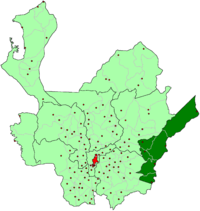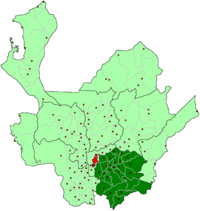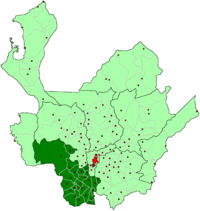| Imperio de Antioquia | |||||
|---|---|---|---|---|---|
| Empire of Antioquia | |||||
| |||||
| Motto "Freedom and Courage" |
|||||
| National Anthem The Antioquian Song | |||||
| Capital | Medellin | ||||
| Official languagess | English, Spanish, Paisan | ||||
| Demonym | Antioquia | ||||
| Government | Socialist Republic | ||||
| - President of the Republic | Kovrov Stoyanovich | ||||
| - Vicepresident | Alfred Garza | ||||
| - President of the People's Committee | Sander Leonardo | ||||
| - Military Committee | Julio Petrenko | ||||
| Formation - Formation of the First Republic - Socialist Republic |
25 May 2012 August 6, 2012 |
||||
| Major Religions | None | ||||
| National Animal | Condor | ||||
| Total Area | 467.615 km². | ||||
| Total Population - Ethnic groups |
2'435.000 Mixed |
||||
| Alliance Affiliation | Legion | ||||
| Currency | Antioquian Peso $ (ANP) | ||||
| Literacy Rate | 86.58% | ||||
| Internet TLD | .an | ||||
| Driving Lane | Left | ||||
| Date Format | dd/mm/yyyy | ||||
| Time Zone | GMT/UTC -5 | ||||
- This country is part of the Post-Dissolution Sphere.
The Empire of Antioquia is an Empire ubicated on South-America. It was created by Kovrov I, who still leads the Empire as of today.
History
Kingdom of Antioquia
The Kingdom of Antioquia was a formal period in the history of Antioquia from 2008 to May of 2012, when antioquia was contituyed as a Monarchy. The 1st and only King of Antioquia was Gustavo Petro, altrougth Petro was at first very popular along the population, he started lossing popularity periodically because his dictatorial and stupid policies, but mostly because he followed all orders from Samper Pastrana, the leader of the Free state of Bogota, this leaded that Antioquia were called a puppet state of Bogota.
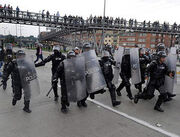
Inital Riots at Medellin
In March of 2012, the general discontent of the population about the new dictatorial policies of the self proclaimed King of all Antioquia, Gustavo Petro and the lack of autonomy of Antioquia, compared to the Free State of Bogota lead to a series of popular riots in medellin and its surroundings. These riots were commanded by the popular politician and philosopher Kovrov Stoyanovich who reached an agreement with Petro. Petro agreed to start the constructions of hospitals and schools across the country, as well as break all relations with the the Free State of Bogota, and Kovrov agreed to cease all hostilities in the capital city.
On March 27 of 2012. Petro , breaked the agreement in front of all his committee and called Kovrov a Populist and declared a bounty on his head, he formed the Royal Committe of Justice in order to capture and execute Kovrov and his followers. This decission leaded to a large armed conflict and Petro was forced to dismiss and escape to Bogota in April 30 of 2012. This action officially ended the Kingdom
Antioquian Unification War

Soldiers recruited by Kovrov
Following the escape of Petro and the dissolution of the Kingdom, Antioquia was submitted into a complete anarchy, and several armed groups formed to reclaim the antioquian lands.
On May 5 of 2012, Kovrov declared himself as Supreme Leader of Antioquia and with an small army stormed for 2 days the City of Medellin. On May 7, after he taked the Grand Palace of Petro, he adressed the antioquian people in the national radio system with the promises of a lasting peace and prosperity for all, he then formed a personal military committee and created the National Army of Antioquia.
Kovrov, with the support of a majority of the population and with the recently created Army, started a series of military campaings against the local armed groups. In May 12 he defeated the Cauca Autonomous League and the New Antioquia Front. On May 20 he started his final campaign against the United Self-Defenses of Antioquia. In the Battle of Necocli, Kovrov killed the leader of the USDA and dissolved the organization, following this, on May 22, the remaining groups surrendered and declared their loyalty to Kovrov. The war ended with the proclamation of the Republic of Antioquia and costed the life of 2.100 Antioquian citizens.
Establishment of the Republic

Session of the Constituent Assembly
On May 23 of 2012, Kovrov summoned a constituent assembly and proclaimed the Constitution of Antioquia, one day later, on May 25 of 2012, the constitution taked efect and the Republic of Antioquia was proclaimed with Kovrov Stoyanovich as the President of the Republic. 4 days later the National Party were founded and the first congress elections were scheduled to June 5. Finally, on June 7 of 2012, Kovrov was appointed for life by the Congress of the Republic as President of the Republic.
Post-Independence War
- Main article: Antioquia-Colombia War
The Post-Independence War otherwise known as the Antioquia-Colombia War was a military conflict between the newly formed republic of Antioquia against the Republic of Colombia This war was a very important victory for the Republic of Antioquia and as result from the war, the Antioquian territories grow over 70% of its original size with Kovrov popularity reaching an amazing point of 96% overall approvation. This conflict opened the door to many other conflicts in the history of Antioquia. During this period Antioquia annexed the galapagos islands and the nation of Puerto rico.
Socialism
On August 6 of 2012, the new constitution of Antioquia, promoted by Kovrov and with a clearly left orientation, was approved in the Military Committee. This constitution bringed a lot of changes in the Economical and Political aspects of the Nation.
Government
Antioquia follows the Constitution of Antioquia proclaimed in 2012.
- Executive: The President of Antioquia is the head of state and chief of the ejecutive power, the President has several powers (stated in the constitution) in order to preserve the national order. The president also appoints the People's Comissars. The Ejecutive power resides in the Popular Palace, in Medellin.In case that the president is absent the Vicepresident will be the head of state until the return of the titular president.
- Legislative: The Legislative power falls to the People's Committee, which consist of one camera. The Committee holds several obligations with the people of Antioquia, as stated on the constitution
- Judicial: The Judicial Power falls to the Supreme Court of Justice, the Supreme Court manages the Popular Courts, these courts are responsable for the judicial process in each region.
People's Comissars
The People's Comissars is one of the most important organs of Antioquia administration, each minister is responsable for the development of their assigned ministry area. The People's Comissars currently consists of 12 Comissioners.
- Comissary of Internal Affairs and Justice
- Comissary of Foreign Affairs
- Comissary of Labour and Social Protection
- Comissary of Urban Development
- Comissary of Rural Development
- Comissary of Education
- Comissary of Transport
- Comissary of Communications and Information
- Comissary of Fatherland Security
- Comissary of Culture
- Comissary of Environment
- Comissary of the Treasury
Economy

Fedean Headquarters in Medellin
The Republic of Antioquia currently has a strong, developing economy. Antioquia counts with healthy industry sector and a very powerful agricultural sector, with an average production of 5.100.000 tons of agricultural products, which represents the 70% of the overall exportations. Fedean is an state-managed institution and it is the bigest company of Antioquia and represents the 32% of the National GDP.
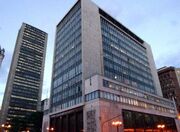
Bank of the Republic
Antioquia uses an unified taxation system with the General Income Tax, which is a 28% of citizens total income. This tax is recolected by the Bank of the Republic, which is also the institution in charge of printing the national currency, the Antioquian Peso.
Military
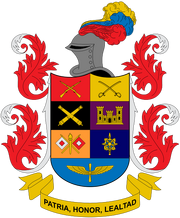
National Army Coat of Arms
The People's Army is in charge of defending antioquia's borders. The NAA is directed by the Military Committee of Antioquia' with the President of the Republic acting as Commander in Chief.
The People's Army has the authorization of the Congress, since the Legislation Act Number 6 of 2012 "Military Equipment and Personel regulations", to purchase equipment freely of other nations with the authorization of the President.
The Navy of the People is in charge of defending the national waters and the sovereignity. The navy also carries out inteligence operations for the Administrative Department of Security. Since the Decree Number 7 of 2012, the Navy is ongoin a massive modernization. The head of the army is appointed by the Military Committee of Antioquia.
Antioquian Air Force
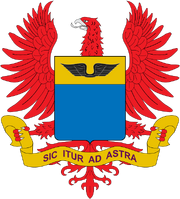
Symbol of AAF
The Antioquian Air Force is the institution in charge of defending the skies of the fatherland. The AAF is jurisdiccion, along with the navi and the infantry, of the Military Committee of Antioquia. Since the Decree Number 7 of 2012, the AAF is ongoing a massive modernization. The head of the AAF is appointed by the Military Committe of Antioquia, as well as the directors of the AAF bases. The AAF currently have two Airports exclusively for their use, 1 of practice and the other 1 of defense, however the AAF also have presence in the Airport of Medellin. The AAF have his own research lab, the "Aircraft Development Center", the location of this center is unknown, but the AAF is already benefiting from this lab, this center has developed the COMECON, a very advanced communications network, the NERATE is based on COMECON.
Foreign Relations
Antioquia has an strict foreign relations policy, the Legislation Act Number 9 of 2012 regulates the foreign transactions with other nations. In order to start a bilateral trade, it MUST be approved the Congress of the Republic, the Congress will examine the Humanitary Situation of the Nation and its Results in the International Economic Competitiveness Index in order to pass and approve the contract.
The Foreign Office is in charge of managing the embassies of Antioquia, the office also holds the responsability of managing the foreign aid system, altrought there are plans of creating a independent institution for this matter.
Education and Social Protection
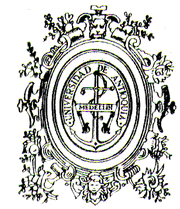
Emblem of the University of Antioquia
The National Education Program is managed by the Educational Board, the board currently consists of 10 members. Education is FREE in Antioquia and all the educational institutions are public and managed by the state. The Network of Public Education currently consists of 12 Grade Schools, 21 High Scools, and 2 Colleges.
The University of Antioquia is the top of the educational system of Antioquia and the center of all technological research in Antioquia. The current Head Master of the University is Alfred Ramz.
The Healthcare system and the Social Policy is responsability of the National Healthcare Board and the Advocacy of the People. Healthcare is free in Antioquia.
Religion and Culture
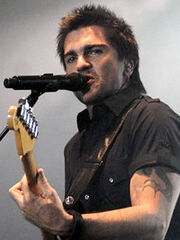
Juanes giving a concert in medellin
There is no national religion, but instead a large amount of mixed teachings and religions. According to the last National Census the 34% of the population is christian, the 26% is muslim, another 10% is Jewish and, surprisingly, a large amount of the 30% of the population is atheist/agnostic.
Culture and high quality art at Antioquia have been and are immense. They have left their mark deep in the life of Antioquia, and have crossed national boundaries very far abroad. The cultural voice Antioquia has walked for virtually all the major capitals of the world in every continent, with the echoes of ambassadors as Botero, Juanes, Jaime Llano Gonzalez, Pelon Santamarta, Tartarin Moreira and many other.
Juanes, for example, a contemporary superstar of the early twenty-first century, a knight of the French cultural order, and has been so far the only artist in the world selected to act before the Post-European Parliament and to act opposite Paul McCartney in super -concerts in Los Angeles and many other places on the planet also have been given many other awards and decorations. Juanes is also the composer, with colaboration of Kovrov itself, of the National Anthem of Antioquia.
Language
There are several languages in Antioquia along with the official languages. English and Spanish are spoken by a majority of the population. While the official language is Paisa, though there are many other languages spoken in the Anntioquia. A majority of all Antioquians are bilingual.
Sports
Sports is a very important part of the Antioquians daily activities. The most popular sport Antioquia is football. The sport in Antioquia is managed by state Federations that exist in order to help organize events. It is common for youth between ages 5–13 to participate in sports at various youth organizations. Many sporting events are anticipated by citizens, and many citizens watch them from their homes. The NERATE has a major contract with the Federation of Sports of Antioquia.
Media and Information

Logo of Telemedellin
Antioquia counts with the NERATE (NEtwork of RAdio and TElevision) which is managed by the minister of communications and information. All channels are public and managed by the state. The main news network of Antioquia is TeleAntioquia and the main entertainment channel is TeleMedellin
Territorial Organanization
Antioquia is divided in 9 sub-regions in order to facilitate the administration of the country. Antioquia currently has 125 municipalties, each one with its own major.
Divisions of the Antioquian territory
The Antioquian territory has the following regions:
- Lower Cauca
- Medium Magdalena
- Northeast'
- North
- Western
- Eastern
- Southeast
- Uraba'
- Aburra Valley
| Lower Cauca | Medium Magdalena | Northeast |
|---|---|---|
| North | Western | Eastern |
|---|---|---|
| Southeast | Uraba | Aburra Valley |
|---|---|---|
Political Parties
The National Party is the only legal and official Political Party of Antioquia. It holds several powers over the administration
Legal Political Parties
| Party | Political Position | Ideology | Other Info |
|---|---|---|---|
| National Party |
Left | Nacional Socialism and Progressivism | Created by Kovrov itself. |
Banned Political Parties
| Party | Political Position | Ideology | Other Info |
|---|---|---|---|
| Liberal Party |
Centre-Left/Right | Liberalism | The third largest political party in Antioquia. |
| Conservative Party |
Right | Conservatism | The second largest political party in Antioquia and the main oposition of the government |
| Revolutionary Communist Party |
Far-Left | Communism | The only truly left party in Antioquia. |
| Legitimate Catholic Movement |
Right | Religious Conservatism | The first Political Party of Antioquia that bases on Religious Beliefs. |
| Antioquia Independence Party |
Centre-Right | Anti-Globalization | Political Party that advocates for the withdrawal of Antioquia from the STOP. |
See Also
| Current Signatories | |
|---|---|
|
|
|
| Former Signatories | |
|
|
| Observers | |
| Former Observers | |
| Self-Declared Signatories | |




